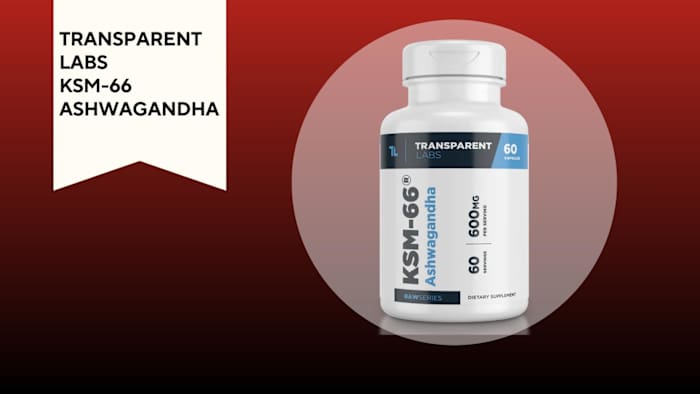The products featured in this article have been independently reviewed. When you buy something through the retail links on this page, we may earn commission at no cost to you, the reader. The Sports Illustrated editorial team is not involved in the creation of this content. Learn more here.
Traditional medicine, particularly Ayurvedic medicine, has used Ashwagandha for thousands of years. A quick google search will show you a long list of potential benefits of ashwagandha including reducing stress, improving cognitive function, regulating thyroid hormones, improving sleep and even supporting weight loss. To take a closer look at the benefits of ashwagandha, I interviewed certified nutrition coach Pete Nastasi from N2 Nutrition.
This article is a combination of Pete’s expert take and my own research, where I break down the science to review both the benefits and the side effects of this powerful herb. Additionally, I’ve included a few of my favorite ashwagandha supplements.
Even with natural substances, keep in mind that you should always talk to your doctor or a registered dietitian before taking any dietary supplements.
This content is meant to be informative, but should not be taken as medical advice. It is not intended for use as diagnosis, prevention or treatment of health problems. Always speak with your doctor before starting any new supplement or exercise regimen.
What Is Ashwagandha?
Ashwagandha is a plant—a shrub if you want to be specific—that has been used in traditional Ayurveda medicine for thousands of years (1). Ayurveda medicine is a traditional practice in India that tries to “maintain health and prevent disease with a holistic focus” that places “a big emphasis on foods and herbs” according to Heather Grzych, Ayurvedic Practitioner serving on the National Ayurvedic Medical Association.
You may have also seen ashwagandha referred to as winter cherry or Indian ginseng. The plant is native to parts of Southeast Asia—particularly India—and parts of Africa. It is growing in popularity as a dietary supplement that you can purchase on its own as a capsule or powder. However, it is also included as an ingredient in certain multivitamins, mixable powders, pre-workouts and herbal supplements.
According to Grzych, ashwagandha is “considered helpful for stress, sleep, anxiety, fatigue, libido and fertility or athletic performance…but most of the studies are focused on the distress and sleep benefits.” After spending hours doing my own research, I found this to be the case as well. The research-backed benefits of ashwagandha can be categorized into two major categories: antioxidant and anti-inflammatory.
Antioxidants are compounds that can be man-made or found in foods and herbs. In general, antioxidants can help protect your body from certain oxygen and nitrogen byproducts that can damage your cells (2)(3). These oxygen and nitrogen byproducts are in everyone’s body because they are produced by natural processes.
Everyone’s body also has inflammation because inflammation is part of your immune system’s response to harmful compounds like diseases, injuries or bacteria (4). Anti-inflammatories like ashwagandha can help reduce inflammation by signaling your immune system to suppress inflammation (5).
All of that is relatively dense, but the bottom line is this: ashwagandha has well-established, concentrated and beneficial properties. This can help you in a variety of ways we will discuss below.
Benefits of Ashwagandha
Ashwagandha is one of the few traditional medicinal herbs that has gone through double-blind, randomized clinical trials. Generally, these studies are relatively small, but many of the results seem to confirm the ayurvedic medicine uses of ashwagandha for stress, anxiety and as a sleep aid.
According to Pete Nastasi, “From the current research, we can see that the main benefits of ashwagandha come from its adaptogenic properties, which means it is able to help the body adapt to stress, enhance cognition and promote an overall sense of well-being.” Let’s take a closer look at what that means for you.
Ashwagandha for anxiety
An adaptogen is a plant or herb that can help the body build resistance to the effects of stress (8). Stress can affect all of the systems in your body from your muscles to your gastrointestinal (GI), your heart and your nervous system (9). When you’re stressed, your body produces cortisol—a necessary hormone that helps your body respond to stress by producing more energy, reducing inflammation or controlling blood pressure (10).
However, too much cortisol can lead to anxiety (11). That’s where an adaptogen like ashwagandha can help. One clinical study of 60 participants tested whether using ashwagandha for eight weeks could reduce stress and promote general wellness (6). The participants who took the ashwagandha extract (either 250 milligrams or 600 milligrams per day) had lower measured cortisol levels than those who took a placebo—in other words, they didn’t just feel less stressed, their body produced less of the stress hormone (7).
Ashwagandha for sleep
Good sleep is essential for general health and wellness. Poor sleep quality can raise your risk for all sorts of diseases, poor physical health and mental health conditions (12). If you have trouble sleeping, or find yourself waking up frequently, there could be a range of causes from your diet to chronic stress. However, there is research to suggest that ashwagandha can improve sleep quality in a variety of ways.
One study of 80 people found that ashwagandha can improve sleep quality for both healthy people and people who struggle with insomnia (13). This study showed improvements in all aspects of sleep including how long it took people to fall asleep, how long they stayed asleep, how often they woke up and how deep their sleep was.
Ashwagandha for weight loss
One of the purported benefits of ashwagandha is that it can help you lose weight. Unfortunately, the current scientific research doesn’t support the use of ashwagandha as a weight loss aid, according to Nastasi. All of the research I was able to get my hands on for this article confirms this as well.
The one exception was a study where participants saw some weight loss when treated with ashwagandha (15). However, in that study, ashwagandha was used to treat chronic stress, which indirectly affected weight loss (14). When cortisol (the stress hormone) speeds up your body’s production of energy, your body starts storing excess calories as fat so it has a consistent supply of energy (9). According to this study, since ashwagandha can help regulate cortisol levels, a derivative of that is that your body stops storing extra fat to prepare energy reserves (15).
Ashwagandha Dosage
The effective dose of ashwagandha in the studies I cited above ranges from 250 milligrams to 750 milligrams per day. However, it is always best to talk to your healthcare provider about ashwagandha doses before using any supplement.
Is Ashwagandha Safe?
There is not enough data to show whether long-term ashwagandha use has any negative side effects, but it is generally safe to use for up to three months according to the National Center for Complementary and Integrative Health (NCCIH) (1). Most of the studies I’ve referenced here used ashwagandha daily for eight weeks.
Ashwagandha Side Effects
Even though ashwagandha is considered generally safe, there are potential side effects you should be aware of. The most common side effects are moderate and include upset stomach (loose stool, nausea, bloating) and drowsiness (16).
According to the National Institute of Health, more serious side effects of ashwagandha are rare but include interactions with anti-anxiety drugs that can cause liver damage, interactions with antidiabetic, immunosuppressants and sedatives, plus, potential spontaneous miscarriage in pregnant women (16). Ashwagandha can also potentially raise testosterone levels which can cause complications for people with certain types of prostate cancer (16). If any of these may apply to you, the NIH recommends you avoid using ashwagandha extract or supplements with ashwagandha in them.
Our Favorite Ashwagandha Products:
Transparent Labs KSM-66 Ashwagandha
The Transparent Labs ashwagandha supplement is a capsule that contains 600 milligrams of KSM-66 ashwagandha per dose. KSM-66 is a patented form of ashwagandha root extract that has undergone 24 clinical trials available to read. KSM-66 is a very concentrated extract that can provide all of the benefits above, plus it may help reduce oxidative stress while promoting muscle strength and recovery after a workout (17).
Another thing we love about Transparent Labs is that the company provides a third-party certificate of analysis for all of its supplements which means it has been tested for purity, potency and ingredient transparency.
Xwerks Ashwa
Conveniently, Xwerks Ashwa come in gummy form—great for people who struggle to swallow large pills. A serving size is two gummies and that serving contains 1,500 milligrams of ashwagandha (750 milligrams per gummy). There is no particular evidence to suggest this amount of ashwagandha is better than the 250-750 milligram effective dose, but I like that users can take one gummy to double the servings while still getting 750 milligrams per dose.
The Xwerks Ashwa gummies are strawberry flavored, and most of the positive reviews on-site say they enjoy the taste.
Swolverine Ashwagandha
Swolverine Ashwagandha is also a gummy, but the formula is slightly different from other ashwagandha supplements. Swolverine Ashwagandha contains 25 milligrams of concentrated ashwagandha extract, which is equivalent to 750 milligrams per dose. However, this supplement also contains 500 percent of your daily value (DV) of vitamin D, which is a key nutrient for bone health (18), reducing inflammation and improving cognitive health (19).
Ashwagandha FAQs
Is it okay to take ashwagandha every day?
You are likely to find anecdotes of people who take ashwagandha everyday for years and don’t experience any negative side effects. However, the research says that ashwagandha is safe to take for up to three months (1), but there isn’t enough evidence to say for sure whether it is safe to take ashwagandha long-term. It is best to consult your doctor before starting an ashwagandha supplement.
How long does it take for ashwagandha to work?
Everyone’s body is different and your response to ashwagandha supplements will depend on a variety of factors. However, many studies reported benefits within four weeks of daily ashwagandha use (13)(6).
When should I take ashwagandha?
You can take ashwagandha at any time throughout the day. There is no evidence to suggest one part of the day is better than any other, but many ashwagandha users on Reddit suggest that you should take ashwagandha on a full stomach if you want to avoid the most common side effects like upset stomach, bloating or loose stool.
Where should I buy ashwagandha?
You can buy ashwagandha supplements from most major supplement retailers and a host of online retailers. However, our favorite ashwagandha supplements are Transparent Labs KSM-66 Ashwagandha, Xwerks Ashwa and Swolverine Ashwagandha.
Wherever you purchase your ashwagandha from, be sure to check the ingredients list for other additives, fillers and artificial ingredients that you may not want in your supplement.
Final Thoughts
Ashwagandha is a potent natural antioxidant and anti-inflammatory extract that can help reduce stress, improve sleep quality and provide secondary benefits by reducing stress hormones. There are ashwagandha powders and capsule supplements available, but regardless of form ashwagandha is generally considered safe to use unless you are pregnant, breastfeeding or have medications that may interact with the supplement. Always consult your doctor before taking ashwagandha or any other dietary supplement.
Prices are accurate and items in stock as of publish time.
Additional Contributors
- Pete Nastasi: Nastasi is a certified sports nutrition coach, certified weight loss practitioner and personal trainer.
References:
- “Ashwagandha.” NCCIH, www.nccih.nih.gov/health/ashwagandha.
- Halliwell, B. “Antioxidants in Human Health and Disease.” Annual Review of Nutrition, vol. 16, 1996, pp. 33–50, www.ncbi.nlm.nih.gov/pubmed/8839918, https://doi.org/10.1146/annurev.nu.16.070196.000341.
- “Antioxidants.” Medlineplus.gov, National Library of Medicine, 2019, medlineplus.gov/antioxidants.html.
- Pahwa, Roma, et al. “Chronic Inflammation.” PubMed, StatPearls Publishing, 8 Aug. 2022, www.ncbi.nlm.nih.gov/books/NBK493173/.
- Sikandan, Abudubari, et al. “Ashwagandha Root Extract Exerts Anti‑Inflammatory Effects in HaCaT Cells by Inhibiting the MAPK/NF‑ΚB Pathways and by Regulating Cytokines.” International Journal of Molecular Medicine, 2 Apr. 2018, https://doi.org/10.3892/ijmm.2018.3608.
- Salve, Jaysing, et al. “Adaptogenic and Anxiolytic Effects of Ashwagandha Root Extract in Healthy Adults: A Double-Blind, Randomized, Placebo-Controlled Clinical Study.” Cureus, vol. 11, no. 12, 25 Dec. 2019, www.ncbi.nlm.nih.gov/pmc/articles/PMC6979308/, https://doi.org/10.7759/cureus.6466.
- Thau, Lauren, et al. “Physiology, Cortisol.” PubMed, StatPearls Publishing, 2020, pubmed.ncbi.nlm.nih.gov/30855827/.
- “What Are Adaptogens and Should You Be Taking Them?” Www.uclahealth.org, www.uclahealth.org/news/what-are-adaptogens-and-should-you-be-taking-them.
- American Psychological Association. “Stress Effects on the Body.” American Psychological Association, 1 Nov. 2018, www.apa.org/topics/stress/body.
- Australia, Healthdirect. “The Role of Cortisol in the Body.” Www.healthdirect.gov.au, 11 Feb. 2019, www.healthdirect.gov.au/the-role-of-cortisol-in-the-body
- Mayo Clinic. “Chronic Stress Puts Your Health at Risk.” Mayo Clinic, 8 July 2021, www.mayoclinic.org/healthy-lifestyle/stress-management/in-depth/stress/art-20046037.
- Nelson, Kathy L., et al. “Sleep Quality: An Evolutionary Concept Analysis.” Nursing Forum, vol. 57, no. 1, 5 Oct. 2021, pubmed.ncbi.nlm.nih.gov/34610163/., https://doi.org/10.1111/nuf.12659.
- Langade, Deepak, et al. “Clinical Evaluation of the Pharmacological Impact of Ashwagandha Root Extract on Sleep in Healthy Volunteers and Insomnia Patients: A Double-Blind, Randomized, Parallel-Group, Placebo-Controlled Study.” Journal of Ethnopharmacology, vol. 264, Jan. 2021, p. 113276, https://doi.org/10.1016/j.jep.2020.113276.
- Tomiyama, A Janet. “Stress and Obesity.” Annual Review of Psychology, vol. 70, no. 1, 2019, pp. 703–718, www.ncbi.nlm.nih.gov/pubmed/29927688, https://doi.org/10.1146/annurev-psych-010418-102936.
- Choudhary, Dnyanraj, et al. “Body Weight Management in Adults under Chronic Stress through Treatment with Ashwagandha Root Extract.” Journal of Evidence-Based Complementary & Alternative Medicine, vol. 22, no. 1, 1 Jan. 2017, pp. 96–106, www.ncbi.nlm.nih.gov/pmc/articles/PMC5871210/, https://doi.org/10.1177/2156587216641830.
- “Office of Dietary Supplements - Ashwagandha: Is It Helpful for Stress, Anxiety, or Sleep?” Ods.od.nih.gov, ods.od.nih.gov/factsheets/Ashwagandha-HealthProfessional/.
- Wankhede, Sachin, et al. “Examining the Effect of Withania Somnifera Supplementation on Muscle Strength and Recovery: A Randomized Controlled Trial.” Journal of the International Society of Sports Nutrition, vol. 12, no. 1, 2015, p. 43, www.ncbi.nlm.nih.gov/pubmed/26609282, https://doi.org/10.1186/s12970-015-0104-9.
- Harvard. “Vitamin D.” The Nutrition Source, 18 Sept. 2012, www.hsph.harvard.edu/nutritionsource/vitamin-d/.
- “9 Vitamins and Minerals You Should Take Daily.” Cleveland Clinic, 4 Nov. 2021, health.clevelandclinic.org/which-vitamins-should-you-take/.













